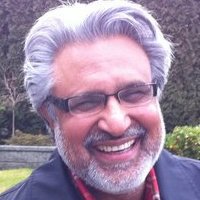
The Marijuana Party is a Canadian federal political party, whose agenda focuses on issues related to cannabis in Canada. Apart from this one issue, the party has no other official policies, meaning party candidates are free to express any views on all other political issues. Passage of the Cannabis Act in June 2018 legalized cannabis on 17 October 2018. However, the party is critical of some of the laws relating to cannabis since legalization and wants to see them changed or reformed. It also seeks to represent and advocate for the rights of cannabis consumers, growers, and small cannabis based businesses.

The 1981 Quebec general election was held on April 13, 1981, to elect members of the National Assembly of the Province of Quebec, Canada. The incumbent Parti Québécois, led by Premier René Lévesque, won re-election, defeating the Quebec Liberal Party, led by Claude Ryan.

Gulzar Singh Cheema is an Indian-born Canadian physician and politician. Cheema was a member of the Legislative Assembly of Manitoba from 1988 to 1993, and a member of the Legislative Assembly of British Columbia from 2001 to 2004, making him one of only a few Canadian politicians to sit in two provincial legislatures since Confederation. He is the first Indian-born person to be elected MLA in Canada. He was also a cabinet minister in the government of Premier of British Columbia Gordon Campbell from 2001 to 2004, and was a candidate of the Liberal Party of Canada in the federal election of 2004.

Terence Hart Young is a politician in Ontario, Canada. He was a Conservative member of the House of Commons of Canada from 2008 to 2015 who represented the riding of Oakville. Previously, Young was a Progressive Conservative member of the Legislative Assembly of Ontario between 1995 and 1999.
The Green Party of Canada ran a full slate of 308 candidates in the 2004 federal election. Some of these candidates have separate biography pages; relevant information about other candidates may be found here.
The Freedom Party of Ontario is a political party in Ontario, Canada.
The Green Party of Ontario fielded 102 candidates in the 2003 provincial election in Ontario, Canada, none of whom were elected. The only riding which the party did not contest was Oakville. Zakaria Belghali had been selected as the GPO candidate, but did not collect enough signatures to have his candidacy validated by Elections Ontario.
The New Democratic Party of Canada ran a full slate of candidates in the 1997 federal election, and won 21 seats out of 301 to emerge as the fourth-largest party in the House of Commons of Canada. Many of the party's candidates have their own biography pages; information about others may be found here.
The Liberal Party of Canada ran a full slate of candidates in the 2000 federal election, and won a majority government by winning 172 out of 308 seats. Many of the party's candidates have their own biography pages; information about others may be found here.
Twelve candidates of the Progressive Conservative Party of Canada were elected in the 2000 federal election, making the party the fifth-largest in the House of Commons of Canada. Many of the party's candidates have their own biography pages; information about others may be found here.
The Canadian Action Party ran a number of candidates in the 2004 federal election, none of whom were elected. Information about these candidates may be found here.
The Canadian Alliance fielded several candidates in the 2000 federal election, and won sixty-six seats to become the Official Opposition party in the House of Commons of Canada. Many of the party's candidates have their own biography pages; information about others may be found here.
The Conservative Party of Canada ran a full slate of candidates in the 2004 federal election, and won 99 seats out of 308 to form the Official Opposition. Many of the party's candidates have their own biography pages; information about others may be found here.
The New Democratic Party of Canada ran a full slate of candidates in the 1993 federal election, and won nine seats out of 295. This brought the NDP below official party status in the House of Commons of Canada for the first, and, to date, only time in its history.
The Conservative Party of Canada ran a full slate of 308 candidates in the 2006 Canadian federal election. Some of these candidates have separate biography pages; relevant information about other candidates may be found here.
There were several independent candidates in the 2006 Canadian federal election. One independent candidate, André Arthur, was elected for the Quebec riding of Portneuf—Jacques-Cartier.
The Communist Party of Canada ran several candidates in the 2006 federal election, none of whom were elected.
Changes to Canadian elections law in 2004 closed "Longley's Loophole". This court decision resulted in the loss of funding for the Parti Marijuana Party and other small parties. The Marijuana Party fielded twenty-three candidates in the 2006 federal election receiving a total of nine-thousand two-hundred and seventy-five votes, averaging (0.82%) across the 23 ridings fielding candidates. In Nunavut, Ed Devries won 7.9% of the vote finishing in fourth place, ahead of the Green Party candidate. Party leader Blair Longley received 332 votes (0.72%) finishing fifth out of six candidates in the Montreal riding of Hochelaga.

Jodie Emery is a Canadian cannabis rights activist and politician. She is the spouse of fellow activist Marc Emery. Until the business was shut down by police, the couple were co-owners of Cannabis Culture, a business that franchised pot dispensaries, later deemed to be illegal. They had obtained the cannabis from illegal sources, according to Crown prosecutors. They are the former operators and owners of Cannabis Culture magazine and Pot TV.

The Ontario Moderate Party is a minor centrist political party in Ontario, Canada founded in 2014. The party's stated foci are improving manufacturing and industry in Ontario, reducing taxes, promoting healthy eating, decriminalizing marijuana, and promoting renewable energy.






